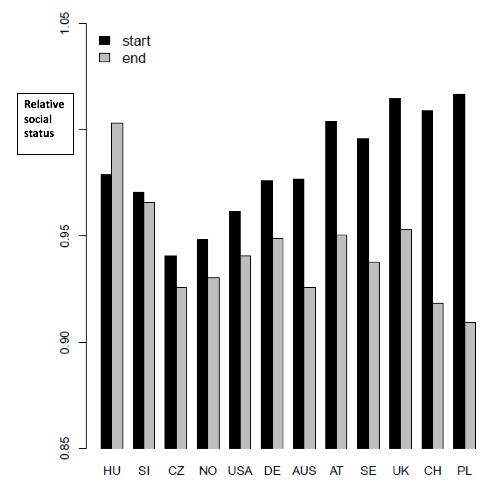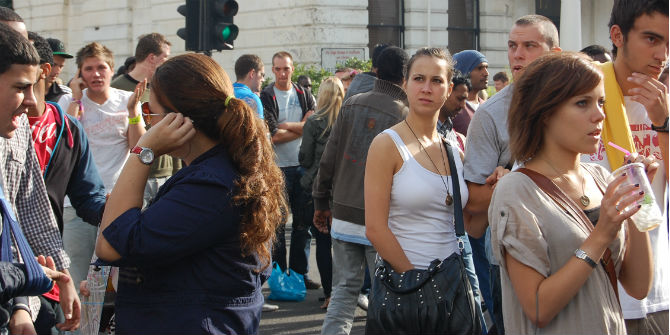
 Noam Gidron (Princeton) (left) and Peter A Hall (Harvard) find that, over the past three decades, white working-class men in Western democracies feel they have lost social standing. People who lack social status tend to be politically alienated and to gravitate towards right-wing populist parties. While Donald Trump appealed directly to these people during his presidential campaign, the perceived fall in status probably increased support for Brexit in the UK. Redistributive policies will not be enough to stem this trend, because social status also depends on providing people with decent, well-paid jobs. But on a symbolic level, politicians also need to ensure that the less-educated feel they have a place and a voice in society.
Noam Gidron (Princeton) (left) and Peter A Hall (Harvard) find that, over the past three decades, white working-class men in Western democracies feel they have lost social standing. People who lack social status tend to be politically alienated and to gravitate towards right-wing populist parties. While Donald Trump appealed directly to these people during his presidential campaign, the perceived fall in status probably increased support for Brexit in the UK. Redistributive policies will not be enough to stem this trend, because social status also depends on providing people with decent, well-paid jobs. But on a symbolic level, politicians also need to ensure that the less-educated feel they have a place and a voice in society.
The Brexit referendum exposed deep political divisions within British society, and more than a year after that vote, those divisions show no signs of disappearing. Although the Leave campaign was carried to victory on the back of a broad coalition, one of its striking features was high levels of support for Brexit among white working-class men without a college education – a group that is also especially likely to vote for right-populist candidates in other countries. Why is there such strong support for right-populist causes and candidates among the white working class?
In both the media and scholarly commentary, discussion of this issue has been dominated by a debate about whether rising support for right populism is rooted in economic or cultural developments. On the one hand, some interpret support for right-wing populism as a rejection of multicultural discourse and post-materialist values. On the other hand, other analysts emphasise the degree to which support for populism is linked with economic distress and insecurity. With regard to Brexit, the former present evidence that those in the Leave camp were driven by perceived cultural threats to national identity, while the latter point out that regional unemployment was strongly associated with support for leaving the European Union.

However, we think that asking whether economic or cultural developments were more important to such outcomes is to ask the wrong question. There are good reasons for believing that economic and cultural developments have operated together to increase support for populism. The more important question, then, is not whether populism is driven by either economic or cultural factors—but rather how economic and cultural forces might combine to shape the populist politics of our time.
In a recent article published in the British Journal of Sociology, we propose that one way to understand how economic and cultural factors interact is to see support for Brexit and right populism more generally among the white working class as a reflection of status anxiety rooted in broader processes of social marginalisation. We support this argument using survey data collected across Western democracies between 1987 and 2014 as part of the International Social Survey Programme.
Our focus is on subjective social status, namely, a person’s sense that they are accorded the social respect or status associated with full membership in society. There are good reasons for thinking that economic and cultural developments have combined to depress the subjective social status of white working-class men. Since social status is typically conferred by levels of income and the quality of one’s occupation, shifting patterns of employment that have eliminated well-paid, medium-skill jobs and forced many men into more precarious positions may well have undercut their own sense of where they stand in society. At the same time, shifts in cultural frameworks, marked by an increasing emphasis in mainstream discourse on racial and gender equality, may have threatened the subjective social status of any who may have relied on the notion that they were white or male to underpin their own sense of social standing.
Thus, economic and cultural developments happening independently of each other may have combined to have additive effects on the social status of some groups. But there may also be interactive effects at work here. For instance, movement toward a knowledge economy has increased the demand for highly-skilled workers and the wage premium to college degrees, putting people without such a degree at an economic disadvantage. But, as more people acquire such degrees, the social esteem accorded those who lack one may well have fallen. In this case, a particular set of economic developments sets in motion changes in cultural frameworks that multiply the effects.
If these conjectures are correct, we should expect to see some decline in the subjective social status of men without a college education over the past few decades, and that is what we find in this study of twelve developed democracies. We measured social status using a question that asked survey respondents to place themselves on a social ladder reflecting whether they were closer to the top or bottom of society. In almost every country within our sample, men without a college education reported lower levels of relative social status in 2014 than they did two or three decades before. These declines were modest but remarkably consistent.
The relative social status of men without a college education circa 1990 and 2014
Source: ISSP Surveys; Gidron and Hall 2017.
Note: Start period for Germany, Sweden, Norway, the Czech Republic and Slovenia is 1992; end period for UK and Hungary is 2009. Otherwise start period is 1987 and end period is 2014.
Is this decline in subjective social status reflected in support for the populist right? We think there are good reasons to believe it is. Previous work in sociology has demonstrated that people care just as much about social status as they do about money. Thus, working-class voters who feel their social status is eroding may well turn against the mainstream parties who have presided over that; and they may well be inclined toward candidates who promise to restore that status, as many on the populist right do. Donald Trump appealed directly to such concerns, for instance, with language evident in this campaign speech:
While my opponent slanders you as deplorable and irredeemable, I call you hardworking American patriots who love your country and want a better future for all of our people. You are mothers and fathers, soldiers and sailors, carpenters and welders […] You are Americans and you are entitled to leadership that honors you, cherishes you, and defends you. Every American is entitled to be treated with dignity and respect in our country.
In line with this, we find that, across the developed democracies, lower levels of subjective social status are strongly associated with voting for right-wing populist parties. Moreover, people who express lower levels of social standing also express higher levels of political alienation (reflected in the belief that one has to be corrupt in order to succeed in life) and deeper opposition to immigration – an attitude important to the populist right and the Leave campaign. We think there is real promise in approaching support for the populist right as a problem of social integration, born of economic and cultural developments that have led some groups of people to feel increasingly marginal to mainstream society.
These findings also carry implications for how the populist challenge can be addressed. Much of the current discussion is focused on providing better material compensation for the ‘losers’ of globalisation, often in the form of more generous programs of redistribution. Yet our research suggests that support for populism is not motivated primarily by demands for more redistribution but by more fundamental concerns about social recognition and respect. Since social recognition is closely-linked to having a decent job, addressing those concerns will require efforts to create such jobs and to make existing jobs more decent. But it will also require efforts on the symbolic plane of political discourse to ensure that people in all walks of life are recognised as valued members of society.
This post represents the views of the authors and not those of the Brexit blog, nor the LSE.
Noam Gidron is a fellow at the Niehaus Center for Globalization and Governance at Princeton University. Beginning in 2018, he will join the faculty of the Department of Political Science and the Joint Program in Politics, Philosophy and Economics (PPE) at the Hebrew University of Jerusalem.
Peter A Hall is Krupp Foundation Professor of European Studies in the Department of Government, Harvard University, and at the Minda de Gunzburg Center for European Studies.








Consider this: when was the last time a TV commercial portrayed white men in a positive, non-ironic way? Probably about 25 years ago, in the early 1990s. Since then they’ve either been mocked or ignored.
True, pretty much [plus all the sitcom dumb dads ….Married with Children etc]
Are you being ironic? Take a look at any TV car advert especially at the more desirable, pricier end. Who’s doing the driving? Who’s being projected as smart, fit and in charge?
This piece actually pisses me off. Here are two white males justifying white males turning to fascism because they feel marginalised. Western society has marginalised groups of people (minorities, women…) for ever, but cleverl white males expected them to fight their oppression by turning left, not right. No matter how heavy the oppression, no matter how damaging the marginalisation, WE are supposed to know better, and make the right choice, and vote Democrat, damn it! See how whites purred with satisfaction at the black community in Alabama saving yet again their sorry ass in an election where the best the poor marginalised whites could muster was a racist, sexist, homophobic nut-case. Maybe Judge Moore felt not socially valued?
I have news for you pals: when you are used to privilege, equality feels like discrimination. It ain’t. Even the poorest, dumbest, meanest white male could feel superior to ‘others’. Well, we see what happens when this unearned privilege is threatened. And we do not need two middle class white males to tell us that we need to make white males feel better. I do not buy it. We had to experience sexism, racism, discrimination, harassment, lynchings, rape, marginalisation, no civil rights. And we held our heads up right, and we piushed, and we fought, and we made the right political choices. But no, apparently, acquiring this modicum of dignity and respect and equal treatment, means that the poor little white males, who still own the world, feel not valued.
This article actually upsets me a great deal. Here we have two middle class educated white males justifying and explaining working class (and middle class, as a lot of well-off white people voted Trump and Brexit) turning fascist out of a feeling of marginalization and loss of social value. I do not buy it. Western societies have marginalized and devalued women, people of colour, homosexuals, disabled people, basically anybody who was not a white male, well, always.
We’ve always had more precarious jobs, and lower pay, and no social status. We still do in many ways: women are paid less than men, they are fired when they get pregnant, they suffer sexual harassment and cannot complain lest they lose their job, they are considered appendices of their husbands; black people are stopped by police more, their educational and social status is doubted and diminished. I could go on, but I feel they you ought to know these things, even if you seem blissfully unaware of this logical, basic, argument. No white male academic ever had to write an article about how the black community is turning to fascist populists to make them feel better about their low social status. But you do not even see this. That is what privilege does to you, by the way: it basically makes you ignorant and unaware to the point of intellectual stolidity.
But WE were supposed to fight the oppression and marginalization, fight for our rights, and make the right political choices. We are supposed to vote Democrat, darn it! Witness the purring of the white middle classes when the black community once again saved the soul of America and voted against Moore, the best the white community could come up with (and voted for, 650,000 of them): a racist, sexist, homophobic nutcase. Maybe he did not feel socially valued? In the face of marginalization and oppression and, not loss, but absence of social status, we held our head high, and fought for our rights. We do not turn Nazi.
When white males, who are losing their unearned privilege, not their social status, feel bad about it, they are allowed to turn fascist. Basically, we have to make sure they can keep their privilege, so that they do not destroy our society. Tell you what, middle class white males, who own the world: start sharing a bit of YOUR privilege with your own brethren. We are not giving up our hard-earned still imperfect EQUALITY.
It is true what they say: when you are used to privilege, equality feels like discrimination.
Ironically [..and sadly] the LSE blog has been censoring comments from angry men in this thread.
Sorry for double-posting! Good insight in the editing process of one’s work…..
I have to disagree with their basic premise – as a white male I started working life as an apprentice and now have an MBA. Regardless of colour, race or creed, it all comes down to work ethic.If you doubt my word, go talk to Dr. Ben Carson…. work ethic is inbred and has SWFA to do with race or the colour of ones skin. Have to love the way these bigots try to integrate Brexit into the innate feeling for nationalism versus globalism. Man are these two screwed up. Do they really have a rational, versus brainwashed, thought?
The tale of two Northern English towns I know very well – Dewsbury and Wakefield.
Dewsbury – a poorer town – voted 57% in favour of Brexit while its richer, higher class neighbour voted 66.3% in favour of Brexit. Moreover, seeing as my brother was heavily involved in counting the ballot papers, I know that there were 600 postal votes in Wakefield (extra effort involved in arranging them – meaning more commitment shown by the voter) … of which 100% were for Leave. No-one felt strongly enough for Remain to arrange a postal vote.
So, why the difference? Pakistani immigration. It’s really as simple as that. In Dewsbury. The Pakistani community voted Remain because the anti-immigration arguments violently repulsed them. Hardly surprising.
In Wakefield – with a much smaller Pakistani community – the richer white population returned a higher Leave vote.
What this shows is that if Muslim immigration continues (and there’s no reason to believe it will slow down), the polarised vote evident in Dewsbury could eventually paralyse national politics. All you need is for a credible Muslim party to form that can attract Muslim voters away from Labour in large amounts. Britain’s first-past-the-post system is perfectly able to deliver Muslim Party MPs from majority areas.
The real irony being that Brexit will likely do the exact opposite of what these voters want when it comes to immigration from Asia. By shutting the door on EU migrants, Brexit will likely lead to more people being brought in from Muslim countries to fill vacant posts in hospitals, abattoirs etc.
@mark b. – to get a visa from non EU countrys you must provide qualifications, and diplomas and have a sponsor, and- not enough but its something- some kind of background check, scanty as it may be.
– from europe there is none of that- its doors open fully to 27 countrys, no matter what no matter who- and there is bugger all you can do about it.personally, i have worked alongside a asian woman from the phillipines, who was like me working in assembly of scientific equipment. she had a doctorat, and her partner was a I.T technician at google. she told me it was very hard to find work for her, and she had taken this as her work visa only allowed her to do this, and a certain number of hours.Respectable, educated professional, filling a work gap, passing criteria. Not any homeless from the E.U.
‘simples’